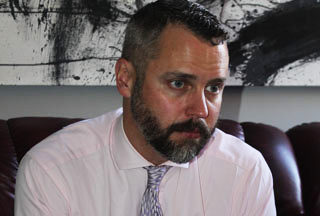
British political scientist, research associate, School of Oriental and African Studies, University of London, Laurence Broers has denied the information spread by Armenian media about that he has visited Azerbaijan’s Nagorno-Karabakh region and observed the so-called election held by the separatist regime there.
Broers said in an interview with Trend that he was not in Nagorno-Karabakh on May 3 when the so-called election was held there.
“I have never been in Nagorno-Karabakh at any election time, and I have never observed electoral processes in the territory,” he said.
Broers said that Armenian Asbarez news portal took some comments he had made in an entirely different interview with an online journal, World Politics Review, misquoted them, and then inserted them into the interview that was allegedly made with Broers in Nagorno-Karabakh on May 3.
“That is very unprofessional and unethical,” he said.
Broers said he visited Nagorno-Karabakh in March, within the framework of the European Union-supported peace building initiative, the European Partnership for the Peaceful Settlement of the conflict over Nagorno-Karabakh.
“This visit took place, as usual, with the foreknowledge of the Ministry of Foreign Affairs of Azerbaijan,” he said, adding that he participated in an event discussing the future of the peace process, the Madrid Principles.
Such visits approved by all parties, are routine and necessary to strengthen confidence-building measures, Broers added.
Commenting on the information spread by Asbarez saying that Broers has allegedly recognized the so-called election legal, he said that Asbarez reporters haven’t had any contact with him, so they cannot speak about his views on this issue.
The so-called election in Nagorno-Karabakh is considered illegitimate by Azerbaijan and the international community because it takes place on territory from which Azerbaijanis have been forcibly displaced, he said.
Therefore, without the participation of the complete electorate, including Azerbaijanis, this “election” is not regarded in the international community as legal, Broers added.
“Parliamentary election” was held by the separatist regime of Nagorno-Karabakh on May 3.
Earlier, Azerbaijani Foreign Ministry said this “election” is illegal.
The conflict between the two South Caucasus countries began in 1988 when Armenia made territorial claims against Azerbaijan. As a result of the ensuing war, in 1992 Armenian armed forces occupied 20 percent of Azerbaijan, including the Nagorno-Karabakh region and seven surrounding districts.
The two countries signed a ceasefire agreement in 1994. The co-chairs of the OSCE Minsk Group, Russia, France and the US are currently holding peace negotiations.
Armenia has not yet implemented the UN Security Council’s four resolutions on the liberation of the Nagorno-Karabakh and the surrounding regions.
—
Follow the author on Twitter @EmmaTariver
Trend
